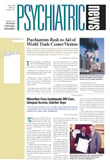An estimated 20 million Medicaid patients in managed care and mental health carveout plans will be guaranteed new protections under a federal rule proposed in August.
Health and Human Services (HHS) Secretary Tommy Thompson praised the proposed rule for providing needed patient protections and giving states flexibility in implementing them, according to an HHS press release.
Thompson promised to have the rule finalized by early next year, although it does not go into effect until August 2002. APA will send HHS its comments on the new rule by the end of this month, which is the deadline for the public comment period.
“Medicaid beneficiaries deserve the same rights and protections as all other Americans enrolled in managed care plans,” said Thompson in the statement.
The rule is designed to mirror many of the patient protections in legislation before Congress (Psychiatric News, August 17). A major difference is that the rule doesn’t give patients the right to sue managed health care plans, provisions for which are included in both the Senate and House versions of managed care reform legislation.
The proposed rule requires managed Medicaid plans to do the following:
• Pay for emergency room care regardless of place or time.
• Provide beneficiaries access to a second opinion from a qualified health professional.
• Provide direct access to a woman’s health specialist in the network for routine and preventive health care services.
• Not interfere with provider-patient communication.
• Document their capacity to serve the expected number of enrollees in their service area.
• Establish a grievance and appeals process. Grievances must be resolved within 90 days and appeals within 45 days. If a patient’s health or life is in danger, the timeframe is shortened to three business days, but two weeks is allowed if requested by an enrollee or managed care plan.
• Provide enrollees with easily understood information about their managed care plan.
Congress authorized the creation of regulations as part of the 1997 Balanced Budget Act to establish patient protections and make it easier for managed care plans to participate in Medicaid by eliminating certain restrictions. For example, under the proposed rule, states do not have to obtain federal waivers to enroll beneficiaries into managed care plans and can impose cost-sharing requirements, according to the press release.
States also have more flexibility to decide “how best to provide patient protections and use managed care in their Medicaid plans,” said Thompson.
The Medicaid rule was proposed by the Clinton administration in 1998 and finalized in January just before the Bush administration took office. The Bush administration, however, delayed its effective date twice this year to gain time to review the rule and make changes.
Thompson said the revised proposal is “more concise and understandable” than its predecessor and “will reduce the regulatory burden on states and health plans,” according to the press release.
HHS was lobbied aggressively by state health plans and governors who complained that implementing the previous “Clinton” rule would be burdensome and expensive, according to an August 17 article in the Washington Post.
Critics of the revised rule have included some senior Democrats in Congress and patient advocacy groups who complain that the patient protections have been weakened.
For instance, HHS changed the expedited grievance and appeals timeframe from three days to three “working days” and up to two weeks if requested.
The proposed rule will also loosen requirements that health plans communicate effectively with patients with limited English and omit a previous requirement that states publish names of health plans with poor performance ratings in local newspapers, according to the Washington Post.
The proposed rule also requires states to submit plans to HHS for providing beneficiaries with high-quality health care and how health plans will measure that quality. The Clinton administration required HHS to decide which quality-of-care measures should be used by health plans, according to the press release.
Thompson justified the changes on the grounds that the previous rule “went far beyond what Congress intended in the 1997 Balanced Budget Act. Its excessive mandates actually threatened beneficiaries’ access to care under Medicaid,” according to the press release.
The proposed federal rule was published in the August 20 Federal Register and is posted on the Web at www.hcfa.gov/medicaid/cms2104p.pdf. Comments should be sent to the Center for Medicare and Medicaid Services by October 20. The CMMS address and other instructions are available on the Web. ▪
